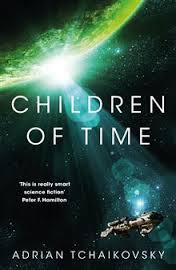Children of Time vignette 2: The Last Martian
Here is the second little slice of time. As you can probably guess, you shouldn't get too attached to any of these characters…
One hundred and four days.
Jenniver Amartez was impressed, in a way. None of it was supposed to last this long, not in these conditions. But it had struggled gamely on and there had come a point, around the sixty day mark, when she had thought they had wrought better than anyone had anticipated, and it would last.
By seventy-five days that illusion was gone. The living systems were too complex to find equilibrium, the environment too hostile to give them the time. Everything had begun to die.
The main colony domes werelong dead by then. By the time she had been able to jury-rig a receiver, the only signals she could pick up were automated warnings, and precious few of those. Pretty much everything had been knocked out.
She didn’t want to think about how many Martians there had been, before the virus pulse from Earth. Thousands, certainly. Men and women and children whose parents and grandparents had been Martians. People whose ancestors had come here when the planet truly was a freezing hell, instead of just a steadily deteriorating purgatory. They had lived in domes and they had worked on the atmosphere – painstakingly transforming it into something that was a slower death for humans, and that could just about sustain other life, with help.
She had not appreciated, until the pulse, just how much help.
Jenniver Alvarez walked through the dying forests of Mars.
Trees stood in tall rows – not really trees, not really like anything that had evolved on earth, but bioengineered life designed to suck in carbon and push out oxygen. The orderly ranks of them ran as far as the eye could see, and the ground around them was carpeted with a man-made moss/fungus symbiote. All artificial, just like everything on Marsexcept the rocks and the ice and the thin carbon dioxide atmosphere that was gradually re-establishing its hold on the planet.
A fourth-generation Martian, she had given her life to Mars. Not long ago she had been able to walk in the plantation without a suit, with only a portable air supply to tipple from, like a hip flask. The biomass around her had pumped out heat and oxygen in such concentrations that she could stand beneath the Martian sky and let the faraway sun fall directly on her skin. She had looked forward to her children or her grandchildren running free and swift in the low gravity, barefoot masters of a world made home by the hand of humanity.
Now she wore a suit for, as the artificial atmosphere around her dissipated, the heat given out by the plants was sucked away. Now she carried her air with her.
Some part of Mars had been green, for a brief moment: a generation in individual human terms, an eyeblink in the history of the species. Now it was brown again as the plantations withered and died around her.
Everything had been so carefully maintained by the computers. The entire colonised area of Mars had been a colossal cybernetic system managed by artificial brains able to tweak every little detail. The vast plantations were maintained by an irrigation network, constantly fed exactly the required balance of nutrients and chemicals to help them conquer the red planet’s ire. When the pulse came, transmitted on multiple frequencies from Earth, travelling at light speed without any warning, every system on Mars had gone down, hopelessly riddled with a virulent artificial plague.
She had been keeping track of the war, of course. There had even been fighting on Mars, though not so very much. Everyone had followed the reports, hoping that someone would win quickly enough that a normal service would be resumed. If not for the NUNs, probably it would have been. But one side in the war had yoked its fortunes to the popular groundswell worked up by the anti-transhumanists, and then they found they were the tail trying to wag the dog. They found you can’t just put crazy like that back into the bottle. Every time someone came to the peace table there was another attack, an assassination, something to fan the flames. On Mars, the colonists had listened to the reports grow graver and graver, until there were no more reports and the only comms they could intercept were military. They were still listening intently when the virus pulse came through.
They had all died, the people in the domes. The computers had been keeping them alive. But Jenniver, out here alone in the agricultural station, she had lived. Here, within the planet’s dying lungs, the work of human hands had persisted for a few more tens of days.
She passed one of the robot workers, little more than a wasted weight of metal. Everything had gone down. She didn’t want to think of the outer colonies, those fragile little bubbles on the gas giant moons or the mining bases in the asteroid belt. The pulse would have reached them all, and further and further, radiating outwards towards the stars.
Not long now.
Jenniver Amartez stood amidst the dying Martian forests and looked out into the dark sky, seeking the dust-shrouded, silent dot that was Earth.

 © 2008-2025 Pan Macmillan
© 2008-2025 Pan Macmillan